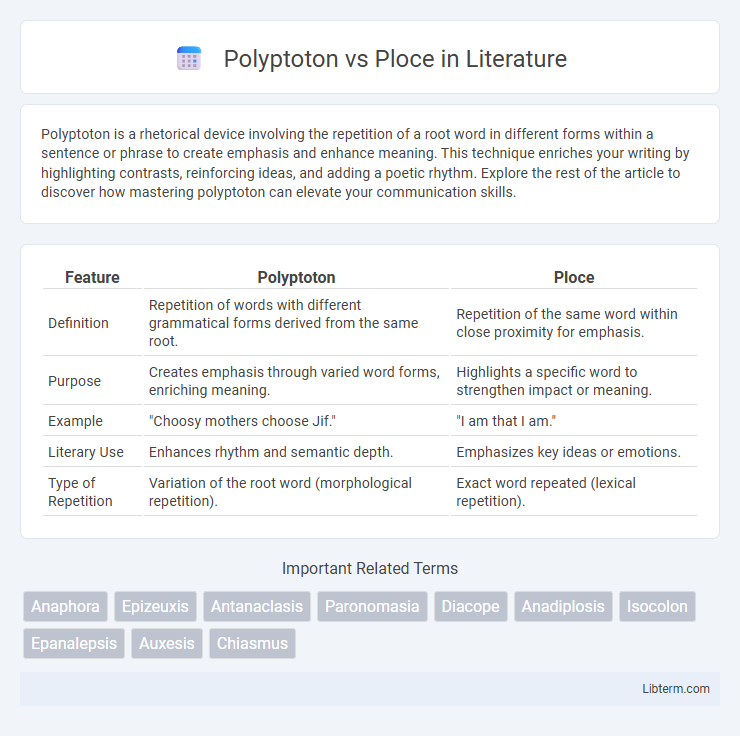Polyptoton is a rhetorical device involving the repetition of a root word in different forms within a sentence or phrase to create emphasis and enhance meaning. This technique enriches your writing by highlighting contrasts, reinforcing ideas, and adding a poetic rhythm. Explore the rest of the article to discover how mastering polyptoton can elevate your communication skills.
Table of Comparison
| Feature | Polyptoton | Ploce |
|---|---|---|
| Definition | Repetition of words with different grammatical forms derived from the same root. | Repetition of the same word within close proximity for emphasis. |
| Purpose | Creates emphasis through varied word forms, enriching meaning. | Highlights a specific word to strengthen impact or meaning. |
| Example | "Choosy mothers choose Jif." | "I am that I am." |
| Literary Use | Enhances rhythm and semantic depth. | Emphasizes key ideas or emotions. |
| Type of Repetition | Variation of the root word (morphological repetition). | Exact word repeated (lexical repetition). |
Introduction to Polyptoton and Ploce
Polyptoton involves the repetition of a root word in different grammatical forms within a sentence, enhancing emphasis and thematic depth. Ploce specifically repeats the same word for rhetorical effect, often highlighting a key concept or emotion. Both figures of speech are central to stylistic expression, enriching literary and rhetorical works through varied repetition.
Defining Polyptoton: Meaning and Examples
Polyptoton is a rhetorical device involving the repetition of words derived from the same root but with different endings or forms within a sentence or phrase. For example, the phrase "With eager feeding food doth choke the feeder" demonstrates polyptoton by using variations of "feed." This stylistic technique enhances emphasis and rhythm by showcasing morphological variations of a core lexical item, distinct from ploce which repeats the exact same word for rhetorical effect.
Understanding Ploce: Explanation and Usage
Ploce involves the repetition of a word within a short phrase or sentence to emphasize a concept or create a rhetorical effect, often highlighting emotional intensity or thematic significance. Unlike polyptoton, which varies the form of a word through inflection or derivation, ploce repeats the same word exactly, reinforcing meaning through deliberate duplication. In literary and rhetorical contexts, ploce enhances persuasion and memorability by drawing attention to key terms, making it a powerful stylistic device in speeches and poetry.
Historical Origins of Polyptoton and Ploce
Polyptoton originated in classical rhetoric, notably used by ancient Greek and Roman orators like Cicero to emphasize key concepts through the repetition of words with different inflections. Ploce, rooted in Hebrew poetry and biblical texts, involves the deliberate repetition of a word for rhetorical emphasis and has been influential in both religious and secular literary traditions. The historical interplay of polyptoton and ploce highlights their foundational roles in shaping persuasive and poetic language across ancient cultures.
Key Differences Between Polyptoton and Ploce
Polyptoton involves repeating words derived from the same root but in different forms, such as "strong" and "strength," to emphasize a concept through variation. Ploce repeats the exact same word within a phrase or sentence to create emphasis or rhetorical effect, like "work work" or "love love." The key difference lies in polyptoton's morphological variation versus ploce's strict repetition of the identical word.
Similarities and Overlaps in Application
Polyptoton and ploce both involve repetition of words derived from the same root to create emphasis and enhance rhetorical effect, with polyptoton repeating different grammatical forms and ploce focusing on the repetition of words for strategic emphasis within a sentence. The overlap in their application is evident in poetic and persuasive language, where both devices intensify meaning by echoing related terms to engage the audience's attention and reinforce key concepts. Their similarity lies in utilizing morphological variants to strengthen thematic coherence and highlight particular ideas, making them effective tools in literary and rhetorical analysis.
Literary Examples of Polyptoton
Polyptoton is a rhetorical device involving the repetition of words derived from the same root but with different endings, like in Shakespeare's "Love is not love which alters when it alteration finds." This technique creates emphasis and rhythm, distinct from ploce, which repeats the same word for a direct effect, such as in Milton's "They look'd and look'd, and each look'd longer." Polyptoton enriches literary texts by intensifying meaning and enhancing the aesthetic quality through varied morphological forms of the same lexical root.
Notable Uses of Ploce in Literature
Ploce, the repetition of a word with a shift in meaning or emphasis, is notably used in Shakespeare's works, such as Macbeth's "Out, out brief candle," emphasizing fleeting life and fate. In Milton's *Paradise Lost*, the repetition of key terms like "dark" highlights themes of chaos and evil. Modern authors also employ ploce, as seen in Toni Morrison's *Beloved*, where repetition deepens emotional resonance and underscores the trauma of slavery.
Effects on Tone and Emphasis
Polyptoton intensifies tone by repeating words with different forms, creating a rhythmic emphasis that highlights key concepts and emotions. Ploce, through the deliberate repetition of the same word, sharpens focus and reinforces a specific idea, making the message more memorable and impactful. Both devices enhance textual emphasis but do so by manipulating repetition in unique semantic and phonetic ways to shape the reader's emotional response.
Choosing Between Polyptoton and Ploce in Writing
Choosing between polyptoton and ploce in writing depends on the desired rhetorical effect and emphasis on repetition. Polyptoton repeats words derived from the same root with different forms, enhancing thematic resonance, while ploce involves the intentional repetition of the same word for emphasis or clarity. Writers should select polyptoton to create stylistic nuance and ploce to reinforce key concepts or emotional intensity in their text.
Polyptoton Infographic

 libterm.com
libterm.com